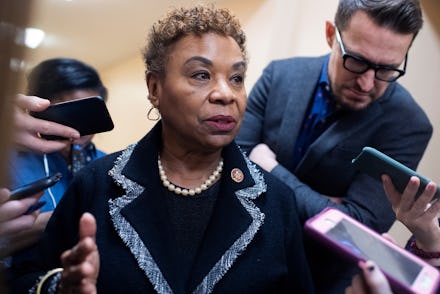Let's revisit Barbara Lee's lonely vote against the Afghanistan invasion

On Sept. 14, 2001 — just days after three airplanes burrowed into Manhattan's World Trade Center and the Pentagon building outside Washington, D.C. — the United States House of Representatives voted 420-1 on a resolution that "authorized to use all necessary and appropriate force against" any country involved in the attacks on 9/11.
That resolution, which flew through the Senate without a single vote against, quickly established itself as the foundational doctrine for what would just weeks later become Operation Enduring Freedom. The effort is now better known as the United States invasion of Afghanistan, the decades-long war which this weekend ended with the rapid implosion of the Western-backed Afghan government and the reclamation of the country by fundamentalist Taliban forces.
But that Sept. 14 vote in the House was not without its lone dissenter: Democratic California Rep. Barbara Lee. In a fiery speech ahead of her "no" vote, Lee explained how she agonized over the resolution, before ultimately deciding to vote against. Here's what she said:
Sept. 11 changed the world. Our deepest fears now haunt us. Yet I am convinced that military action will not prevent further acts of international terrorism against the United States. This is a very complex and complicated matter. Now, this resolution will pass, although we all know that the president can wage a war even without it. However difficult this vote may be, some of us must urge the use of restraint.
Our country is in a state of mourning. Some of us must say, let’s step back for a moment. Let’s just pause, just for a minute, and think through the implications of our actions today, so that this does not spiral out of control. Now, I have agonized over this vote. But I came to grips with it today, and I came to grips with opposing this resolution during the very painful, yet very beautiful, memorial service. As a member of the clergy so eloquently said, as we act, let us not become the evil that we deplore.
In an essay published a few days later in SF Gate, Lee expanded upon her decision, writing:
We must respond, but the character of that response will determine for us and for our children the world that they will inherit. I do not dispute the president's intent to rid the world of terrorism — but we have many means to reach that goal, and measures that spawn further acts of terror or that do not address the sources of hatred do not increase our security.
Secretary of State Colin Powell himself eloquently pointed out the many ways to get at the root of this problem — economic, diplomatic, legal and political, as well as military. A rush to launch precipitous military counterattacks runs too great a risk that more innocent men, women, children will be killed. I could not vote for a resolution that I believe could lead to such an outcome.
In the nearly two decades since Lee's vote, her stance against granting broad, nebulous authority to wage a war without parameters and benchmarks has only proven to be more and more prescient with each passing year. This week's collapse of the Afghan government, and the Taliban's near-instantaneous takeover of the country they controlled before 9/11, only underscores the degree to which Lee's concerns over a botched military intervention and a subsequent "spiral" into a chaos have proven eerily accurate.
Given the seemingly irrevocable political polarization in this country, it's unlikely that Lee will ever get the widespread recognition she deserves for having the courage to stand alone against overwhelming popular opinion at the time. But it's impossible to deny that Lee's sole vote against the Afghanistan invasion remains one of the crucial inflection points in American history.